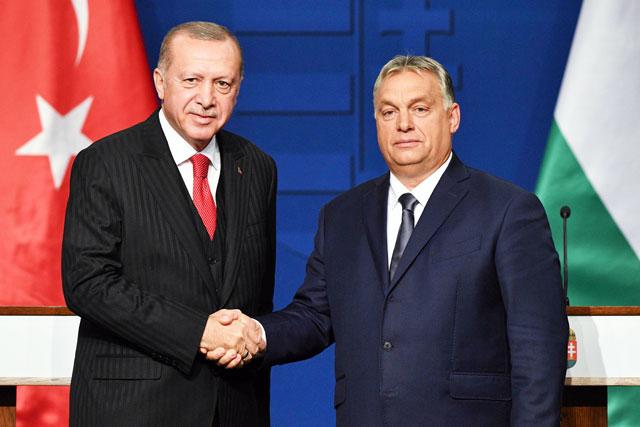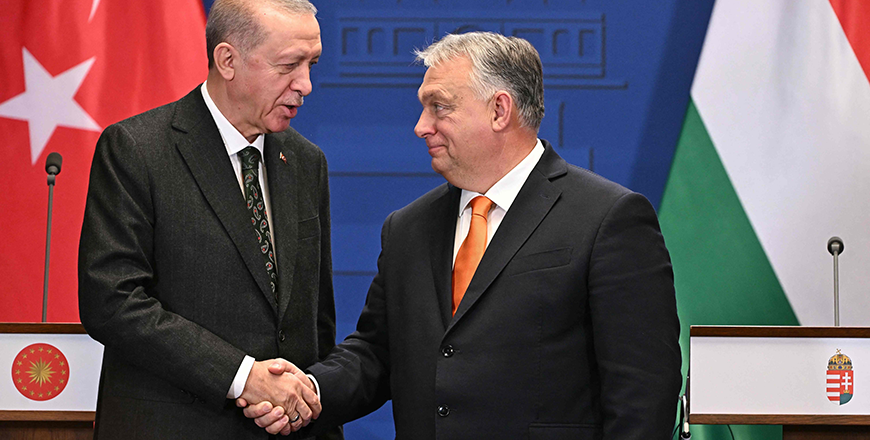You are here
Erdogan visits Hungary facing protests over Syria
By AFP - Nov 07,2019 - Last updated at Nov 07,2019

Turkish President Recep Tayyip Erdogan (left) and Hungarian Prime Minister Viktor Orban shake hands after addressing a press conference at Varkert Bazar cultural center in Budapest on Thursday (AFP photo)
BUDAPEST — Turkish President Recep Tayyip Erdogan heads to Hungary on Thursday for talks with Prime Minister Viktor Orban — a rare EU ally — but is expected to face protests over his deadly military offensive in Syria.
The meeting comes just a week after Orban met Russian President Vladimir Putin.
Thousands of demonstrators are expected to take part in rallies organised by civil society groups in Budapest over Turkey's assault on Kurdish fighters in Syria
Ankara launched the military operation last month to push Syrian Kurdish forces back from its border and create a "safe zone" to take in some of the 3.6 million Syrian refugees currently in Turkey.
Hungary delayed an EU resolution condemning Turkey's action, with Orban insisting that the offensive was in "Hungary's national interest" because it would help stop refugees coming to the EU.
If Erdogan does not enable refugees to return to Syria, he could "open the gates towards Europe" for millions of migrants, said Orban, an anti-immigration figurehead for nationalists in Europe and beyond.
At a meeting in Kazakhstan last month, Erdogan personally thanked Orban for his "support" for Ankara's Syrian operation
Orban was also one of the few European leaders to attend Erdogan's July 2018 inauguration ceremony for his second term in office, while the Turkish leader visited Hungary in October last year.
"[Orban's] Turkey policy fits in with his strategy towards the east, trying to give political favours for economic ones," Daniel Bartha, director of the think tank Centre for Euro-Atlantic Integration and Democracy, told AFP.
'Berlin-Moscow-Istanbul triangle'
The Hungarian army plans to buy Turkish armoured vehicles, according to media reports, while a Budapest-based Turkish business magnate is close to both Orban's family and to Erdogan.
Hungary's partly state-owned energy giant MOL also bought last week a stake in the Baku-Tbilisi-Ceyhan pipeline that transports crude oil to the Mediterranean through Turkey.
Orban defends his foreign policy of "eastern opening" as pragmatic cooperation with larger regional powers.
"We live in a Berlin-Moscow-Istanbul triangle," he told a press conference last week in Budapest alongside Putin, also a regular visitor to the EU and NATO member state
Accusing his Western critics of turning a blind eye to their own countries' trade and political engagements with eastern countries, Orban has repeatedly defended Ankara.
"Turkey's stability is the guarantee of our security," he said during last year's visit by Erdogan, referring to the role of Turkish authorities in controlling migration into Europe.
The Hungarian government appears to perceive Turkey as an emerging, key geopolitical player, not only in Syria but also in south-eastern Europe and the broader Middle East," said Daniel Hegedus, an analyst with the German Marshall Fund of the United States.
"It seems ready to accept significant conflicts within the EU to please Ankara, and acts according to the interests of Turkey and Russia rather than the Western alliances Budapest belongs to," Hegedus told AFP.
Related Articles
ANKARA — Turkey's parliament on Tuesday ratified Sweden's NATO membership after more than a year of delays that upset Western efforts to sho
BUDAPEST — Turkish President Recep Tayyip Erdogan said on Monday that he would seek deeper ties with Hungary’s Prime Minister Viktor Orban,
BRUSSELS — The European Union's executive arm on Sunday proposed suspending 7.5 billion euros in financing for Hungary, as it awaited potent












